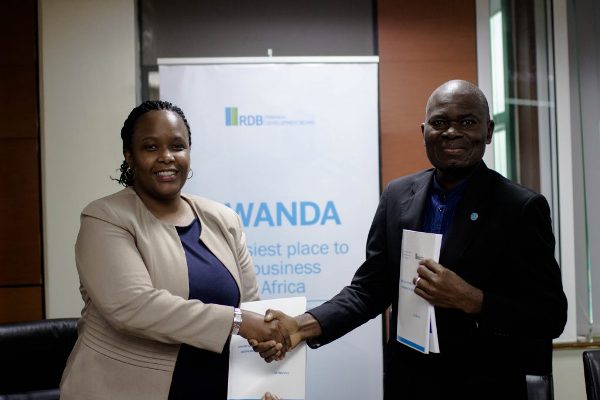
Kigali: RDB (Rwanda Development Board) and the Food and Agriculture Organization (FAO) have today entered into a partnership aimed at building capacities and digitizing agricultural value chains.
The three-year project, titled, “Support local suppliers’ capacity development and promote e-commerce in Rwanda”, will enable farmers, companies and other stakeholders across agricultural value chains to increase productivity and incomes.
This will be done by among others conducting capacity building sessions on electronic commerce and payment systems, provision of logistics solutions and smart irrigation techniques.
The intervention will target three selected agriculture value chains, which are; Horticulture, Livestock and Agribusiness.
Some of the expected outcomes from the project include creating linkages for farmers and distributors of farm produce with buyers such as hotels; increasing the farm gate price for farmers’ produce; reducing the country’s import bill as well as allowing local companies to compete in both the local and global markets.
RDB will work with other partners such as the Ministries of Agriculture and Animal Resources, Trade and Industry and ICT and Innovation in implementing the project.
Commenting after signing the partnership today, RDB Chief Executive Officer, Clare Akamanzi said:“Agricultural transformation especially through competitive value chain development is among the key pillars of our National Strategy for Transformation and FAO is a very important partner in achieving this. We will ensure that we make the most of this throughout the project implementation.”
On his part, Gaulbert Gbehounou, the FAO Representative of Rwanda said: “As FAO, we support our member countries to engage in sustainable agriculture and when we talk about sustainability, it has three dimensions; environmental, economic and social. The environmental dimension is there to ensure that agricultural production doesn’t degrade the environment. And once farmers produce, they need to sale and make sure they earn a good living from their cultivation because if they earn well from their farming they can be able to improve and create jobs. So we are happy and I look at this partnership with RDB as a start of something bigger we can do together.” (Fin)
